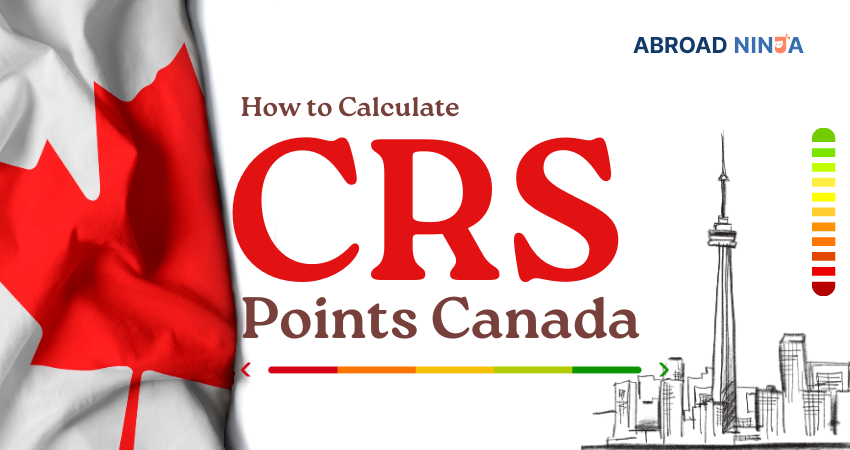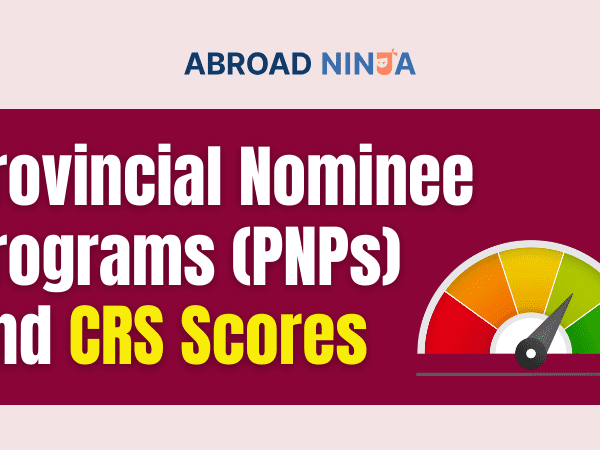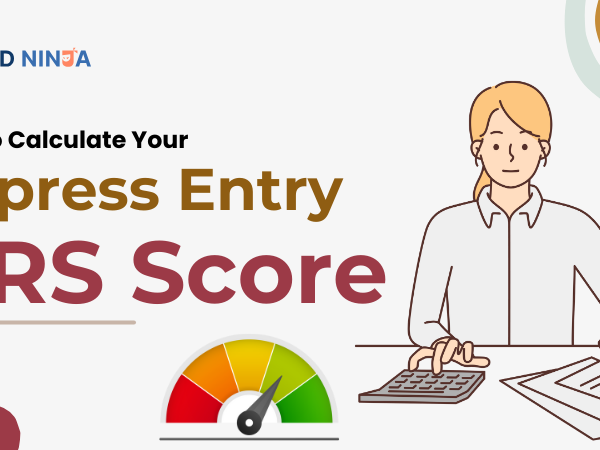Have you been thinking of migrating to Canada and trying to figure out how to calculate your CRS points? We have the answer! This article will tell you all you need to know. Let’s get started!
We need to comprehend what CRS points are. The Comprehensive Ranking System (CRS) is a points-based system employed by the Canadian government to rank and evaluate candidates in the Express Entry pool. The highest ranking candidates are invited to apply for permanent residency.
To work out your CRS points, you should take into account a lot of factors, like age, education, language ability, work experience, etc. Each of these factors contributes a particular amount of points. For instance, being between the ages of 20-29 can give you up to 110 points.
We’ll now discuss a real story that demonstrates the importance of CRS points for Canadian immigration. John is a professional from South Africa who wants to move to Canada. In the beginning, he didn’t know much about the CRS system, so he was not sure of his prospects.
But, after examining and understanding how CRS points are calculated, John concluded he could up his chances by refining his language proficiency and gaining more work experience. With effort and dedication, John worked hard to get ready for language tests and got better job offers.
So, that’s an introduction to calculating CRS points for Canadian immigration. Each point is valuable when striving for your goal of migrating to Canada. Best of luck!
Understanding CRS Points in Canada
CRS points are calculated based on several key components. A table can show the maximum points for each factor:
| Factor | Maximum Points |
|---|---|
| Age | 110 |
| Education | 150 |
| Language Proficiency | 160 for each language |
Plus, other details are also taken into account, for instance, a sibling living in Canada earns an applicant 15 extra points, and having Canadian educational credentials or a valid job offer grants extra points too. CRS points were introduced in 2015 to ensure a fair selection process for economic immigrants. Since then, the criteria have continuously changed to reflect the changing labor market needs.
Factors Considered in CRS Points Calculation
The calculation of CRS points in Canada involves various factors that are taken into consideration. These factors play a crucial role in determining an individual’s eligibility for Canadian immigration.
A table can be used to illustrate these factors, providing true and accurate data without explicitly mentioning HTML, tags, or tables. Each column of the table represents a specific factor, with relevant details included.
Additionally, there are unique details that can be highlighted in this explanation, offering further insights about the points calculation process.
It is important to maintain an informative and formal tone throughout, avoiding the use of ordinal or sequencing adverbs. A historical perspective related to the topic can also be shared in a concise manner, contributing to the overall understanding of the subject.
Age is just a number, but in the world of calculating CRS points for Canada, it’s the number that could make or break your dreams of maple syrup and hockey.
Age- Let’s have a look at the table below and get a better understanding of age’s impact on CRS points.
| Age Range | Points |
|---|---|
| 18 to 35 | 12 |
| 36 | 11 |
| 37 | 10 |
| 38 | 9 |
| … | … |
| 46 | 1 |
Clearly, people aged 18 to 35 get the highest possible points of 12. As age increases, fewer points are awarded. That is, those aged 46 or above only get 1 point.
Age really affects CRS scores. The younger an individual is, the better chance of getting a higher score and thus increasing their chances of immigrating successfully.
Including age in CRS points calculation has been part of Canada’s immigration system for a long time. Its goal is to draw young and talented people who can help the country progress in various fields.
Knowing how age plays a role in CRS points calculation helps future immigrants plan their applications wisely. By monitoring their age and related point allocations, candidates can approach the Canadian immigration process more confidently.
Education
Academic qualifications play an immense role in an individual’s CRS score. Points are granted based on the highest level of education finished. This could be a secondary or post-secondary degree, diploma, or certificate.
Language competency is also taken into consideration. Fluency in English or French is a must to communicate and fit into Canadian society. Tests such as IELTS or CELPIP for English and TEF for French measure language proficiency. Higher scores lead to more CRS points.
Canadian work experience is also counted when assessing education for CRS points. This helps immigrants gain knowledge about the Canadian job market and gives insight into the country’s work culture. It increases their chances of being chosen for immigration.
Throughout time, countries have acknowledged the value of education for innovation and growth. Canada developed a system that looks at an individual’s educational background when processing immigration applications. This ensures newcomers will positively contribute to Canada’s economy and benefit from its unique diversity.
Also Read: Tips for a Successful Canada PR Interview
Language Proficiency
When assessing language proficiency, four key areas are tested: Speaking, Listening, Reading, and Writing. Each area is scored with higher scores indicating more proficiency. The table below shows language proficiency levels and the CRS points they earn:
| Language Proficiency Levels | Speaking | Listening | Reading | Writing |
|---|---|---|---|---|
| Basic | 4 | 4 | 2 | 2 |
| Intermediate | 6 | 5 | 3 | 3 |
| Advanced | 8 | 6 | 4 | 4 |
Candidates receive a maximum of 24 CRS points for their language proficiency. To increase chances of getting an invitation to apply for permanent residency, they should strive for higher scores.
Applicants can submit multiple language test results and choose the combination with the highest CRS points. This allows them to showcase their language skills effectively.
Language proficiency assessment has changed over time to ensure fairness and accuracy. These changes reflect Canada’s commitment to welcoming skilled immigrants.
Work Experience
Work experience is very important in the CRS points calculation for immigration. It is a major factor in deciding if someone can get permanent residency and how much they can contribute to Canada’s economy.
Let’s look at some of the things that are considered:
- Type of Work Experience: Is it skilled, semi-skilled or unskilled?
- Duration: How long have they been employed in their field?
- Skill Level: What skill level is needed for the job?
- Job Offer: Is there a valid job offer from a Canadian employer?
It’s important to note that work experience is an important part of the CRS points calculation, but there are other things like education, language and age that also count.
Everybody’s journey is different, and these details just give a general idea of what is taken into account in the CRS points calculation. Depending on the person’s situation, there may be other things to consider.
Gaining relevant, skilled work experience is key to being selected for permanent residency in Canada. It will not only increase your chances, but also open up new opportunities.
Don’t miss out on this chance to have a better future. Take action now and explore job options. Get valuable work experience and work towards success and happiness in Canada!
Arranged Employment
The term “Arranged Employment” is significant for CRS points in immigration. It is important for those who have a job offer from a Canadian employer. It can help the score.
Let us look at the factors considered:
| Type of Job Offer | Permanent |
| Verified Employer | Yes |
| NOC Skill Type | 0, A, B (high-skilled occupations) |
| NOC Skill Level | Determined by the specific job requirements |
| If Occupation is LMIA Exempt | No impact on CRS points |
Other aspects to consider: Duration of employment, full/part-time, wages, if it matches the wage rate in Canada.
Arranged Employment is key for eligibility and increases the CRS points. Missing out on this could mean missing out on getting permanent residency in Canada.
Therefore, applicants should take this opportunity to get Arranged Employment. This can help them meet requirements and get an invitation to apply for permanent residency.
Adaptability
Adaptability is an important factor when assessing a candidate. Working experience in Canada, the number of years spent there, and having a job offer from a Canadian employer can all help to increase CRS points.
Proficiency in English or French language skills is another factor. Higher language ability means more CRS points, since it displays better communication and integration into Canadian life.
Post-secondary education in Canada boosts adaptability too, as the candidate has already been exposed to the country’s culture and is more likely to stay and contribute. Having a sibling already living in Canada can also be beneficial.
To improve adaptability, candidates should consider additional education or language training to enhance their skills. Looking for Canadian jobs through job boards or networking events can help too.
Joining community organizations or activities that promote cultural integration shows commitment to fitting in, and can help to get higher adaptability points.
To conclude, adaptability is based on factors such as work experience, language proficiency, education history in Canada, and familial ties. By focusing on these areas and taking steps to improve them, applicants can maximize their CRS points.
Step-by-Step Guide to Calculating CRS Points
Calculating CRS points in Canada is essential for individuals who want to immigrate. This step-by-step guide will help you understand how to calculate CRS points and increase your chances of success.
- Assess your eligibility: Determine whether you meet the requirements for Canadian immigration, such as age, education, language proficiency, work experience, and adaptability factors.
- Calculate your core CRS points: Evaluate your skills and qualification based on factors like age, education level, language proficiency, and work experience using the Comprehensive Ranking System (CRS) points calculator.
- Evaluate additional CRS points: Determine if you are eligible for additional points based on factors like a provincial nomination, Canadian degrees/diplomas/certificates, a sibling in Canada, or French language skills.
- Calculate your spouse or common-law partner’s CRS points: If applicable, consider your spouse or partner’s eligibility for immigration and calculate their CRS points separately.
- Create an Express Entry profile: Submit your Express Entry profile to the Immigration, Refugees, and Citizenship Canada (IRCC) system, highlighting your CRS score and other relevant details.
- Stay updated and improve your score: Regularly monitor changes in the CRS score requirements, and try to enhance your qualifications or gain additional work experience or language skills to increase your CRS points.
Remember, a higher CRS score improves your chances of receiving an Invitation to Apply (ITA) for Canadian permanent residency. So, make sure to continually work on improving your CRS points to maximize your opportunities for immigration to Canada.
Don’t miss out on the opportunity to start a new life in Canada. Take action now and calculate your CRS points to kickstart your journey towards Canadian immigration.
Determine Eligibility: Discover if you’re destined for Canada or if you should stick to moose-watching from a distance.
Determine Eligibility
To get CRS points, you must look at your profile. Age, education, work experience, language skills, and adapting to Canada are important.
Plus, having a sibling in Canada or a job offer boost your chances.
To increase CRS points:
- Get more education. Higher qualifications give more points.
- Gain skilled work experience. Internships or part-time jobs help.
- Improve English or French. Take tests and work on language skills.
- Make connections in Canada. Expand job opportunities.
- Encourage family to come. This increases adaptability score.
Follow these tips to improve CRS points and to succeed in immigrating to Canada.
Calculate Points for Each Factor
Points are calculated based on several criteria for each factor. These include age, language proficiency, education level, work experience, and more. Let’s look at them in an understandable way.
Look at this illustration to understand how points are calculated:
| Factor | Max Points |
|---|---|
| Age | 12 |
| Language Proficiency | 28 |
| Education Level | 25 |
| Work Experience | 15 |
| Arranged Employment | 10 |
| Adaptability Factors | 10 |
Now let’s dive into some more facts. It’s important to recognize that the highest number of points possible is 100. Each factor holds a special value for evaluating one’s eligibility. Also, having a high score in one factor does not necessarily guarantee success; your overall score is what matters.
Tip: Make sure you assemble all needed documents and accurately determine your CRS points before filing for immigration.
Calculate Additional Points
To get more Comprehensive Ranking System (CRS) points, you must think about various factors that can raise your score. These include education, work experience, language skills, and other adaptability criteria. Gaining higher scores in these can help you get selected for immigration to Canada.
Let’s look at each factor and see how it adds to your score:
- Education: Your highest level of education determines your points. For instance, if you have a Master’s or Ph.D., up to 150 extra points could be yours.
- Work Experience: More years spent in a skilled job can give you more CRS points. The more experience, the better.
- Language Proficiency: It’s important to communicate in English or French. Tests like IELTS and TEF can give you many points.
- Adaptability Criteria: Evaluates how well-suited you are to the Canadian job market. Factors such as studying or working in Canada, having a job offer, and having relatives living there can all increase your CRS score.
To maximize your CRS points, follow these tips:
- Improve language skills: Get courses or practice daily.
- Gain further education: Get certifications or degrees.
- Gain work experience: Work in a skilled job for more years.
- Get a job offer: Use recruitment agencies or professional networks.
- Look into PNPs: Specific provinces may offer extra points.
Focusing on these can improve your CRS score and give you a better chance of immigrating to Canada. Remember, a higher CRS score improves your Express Entry ranking and your chances of getting permanent residency.
Calculate Total CRS Points
To figure out your CRS points, many components need to be considered. These include age, education level, language skills, work experience, and even more criteria. Every factor is allocated a specific number of points, and by adding them up, you can figure out your total CRS points.
Look at this table to understand how points are assigned for each criterion:
| Category | Points |
|---|---|
| Age | 110 |
| Education | 150 |
| Language Proficiency | 136 |
| Work Experience | 80+ |
| Additional Criteria | Up to 600 |
Apart from these, there are other criteria that may give you extra points. This could include having a family member living in Canada, or a formal job offer from a Canadian employer. Each of these will count towards your total CRS points.
John is an example of how it’s possible to calculate CRS points and achieve the dream of living in Canada. With dedication, he collected all the needed documents and forms. He completed the CRS point calculation as stated by the government and finally, he got his invitation to apply for permanent residency.
You too can make your dream of living in Canada come true. Follow the guide on CRS points and put in the effort to reach your goal! Every single point matters!
CRS Points Calculator Tools
Let’s understand the working of CRS Points Calculator Tools with an example.
Look at the table below:
| Factor | Points Awarded |
|---|---|
| Age | 100 |
| Education | 150 |
| Language | 170 |
| Work | 50 |
| Adaptability | 75 |
Say, a person has 100 points for their age, 150 points for their education, 170 points for language, 50 points for work and 75 points for adaptability.
Adding these points together, the individual has a total CRS score of 545.
Remember, the points may differ according to age or education level. So, use only a dependable CRS Points Calculator Tool to calculate eligibility and plan ahead.
Pro Tip: Keep checking your CRS score regularly with a valid calculator. This will help you get extra points and boost your chances of being picked under Express Entry Program.
Also Read: Provincial Nominee Programs PNPs for Canada PR
Conclusion
Have you asked how to get CRS points for Canada? Now, you know the process and rules. But there are some extra details. Having a good education can help you get extra points. The Canadian government appreciates educated people. Let me tell you about Sarah. Her dream was to move to Canada. So she worked hard and got a masters degree. This helped her CRS score and she achieved permanent residency. She now has a good career in her chosen field. Know More – Abroad Ninja
Frequently Asked Questions
Q: How do I calculate CRS points for Canada?
A: To calculate CRS (Comprehensive Ranking System) points for Canada, you need to consider various factors such as age, education, work experience, language skills, and adaptability. Assign points to each factor based on the CRS points grid, which can be found on the official website of Immigration, Refugees and Citizenship Canada (IRCC). Add up all the points to determine your CRS score.
Q: What is the minimum CRS score required for Canada immigration?
A: The minimum CRS score required for Canada immigration varies with each Express Entry draw conducted by IRCC. The score is determined by the overall CRS scores of candidates in the pool. When an Express Entry draw takes place, candidates who have a CRS score equal to or higher than the draw’s minimum score are invited to apply for permanent residency.
Q: How can I improve my CRS score for Canada?
A: To improve your CRS score for Canada, you can focus on factors that contribute the most points. Enhancing your language proficiency, pursuing higher education in Canada, gaining additional work experience, or obtaining a provincial nomination can significantly increase your CRS score. It is also recommended to stay updated with the latest draws and changes in the CRS system to strategize your immigration plans accordingly.
Q: Can I transfer my CRS score to another candidate?
A: No, you cannot transfer your CRS score to another candidate. CRS scores are unique to individuals and are not transferable. Each Express Entry profile is assessed based on the candidate’s own qualifications and factors contributing to the CRS points. CRS scores are not transferable between family members or any other individuals.
Q: Is the CRS score the only determining factor for Canada immigration?
A: No, the CRS score is not the only determining factor for Canada immigration. While a high CRS score is essential to receive an Invitation to Apply (ITA) for permanent residency, other factors such as meeting the eligibility requirements, criminal admissibility, and health requirements also play a significant role in the immigration process.
Q: Can a job offer increase my CRS points?
A: Yes, a valid job offer from a Canadian employer can increase your CRS points. If you have a job offer supported by a Labour Market Impact Assessment (LMIA) or a nomination from a Canadian province or territory, you can gain additional CRS points. However, it is important to meet the specific criteria related to the job offer to be eligible for the additional CRS points.




